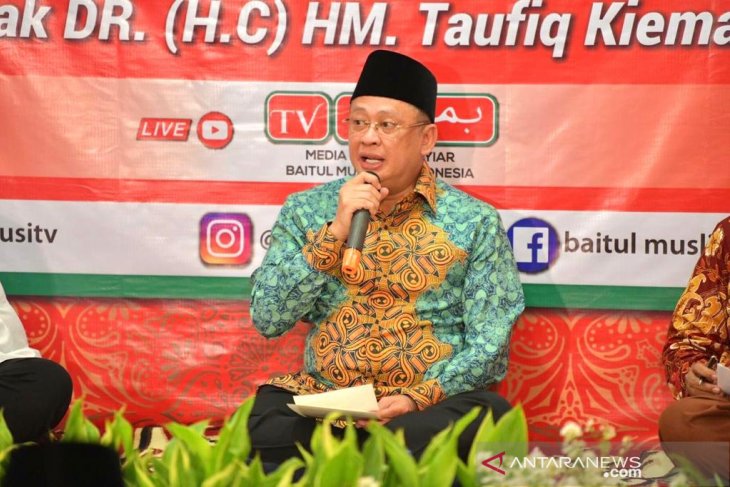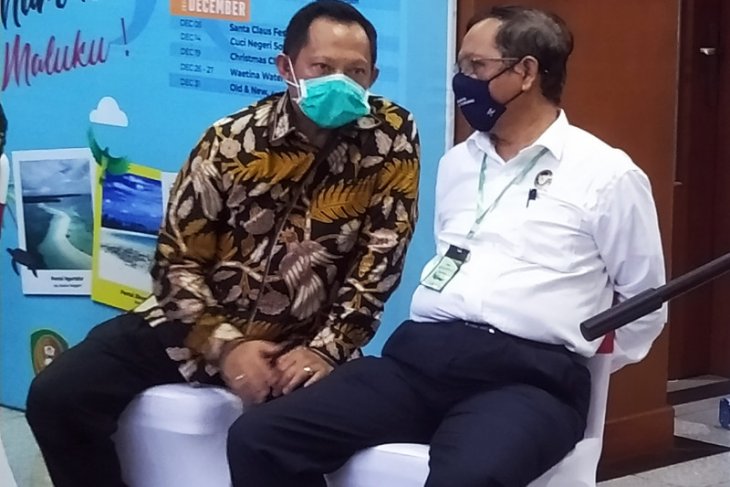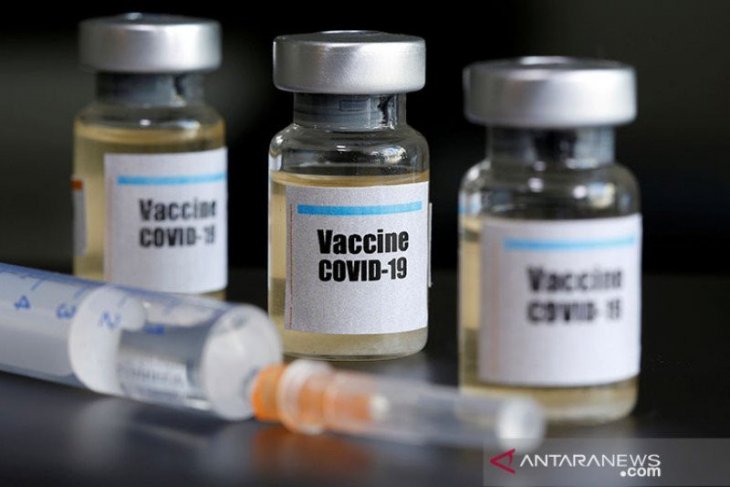Live Streaming
Program Highlight
Company Profile

Ani Hasanah
July
 Chairman of the People's Consultative Assembly (MPR) Bambang Soesatyo. ANTARA/Special
Chairman of the People's Consultative Assembly (MPR) Bambang Soesatyo. ANTARA/Special
Chairman of the People's Consultative Assembly (MPR) Bambang Soesatyo highlighted the urgency for Indonesian people to make a commitment and build collective awareness that child protection is everyone’s responsibility.
Hence, the government must be present and take sides with children, while parents must become role models, and the society must offer support to children, Soesatyo noted in his remarks during a function to observe National Children's Day at the Parliament complex in Jakarta on Thursday.
"It is our shared responsibility to guard and protect our children so that their rights and nature can be guaranteed and guarded," the MPR chairman noted in a statement here on Friday.
Families and the surrounding community must ensure that children feel safe, physically, and psychologically, he emphasized.
Soesatyo noted that child protection was in accordance with the 1945 Constitution of the Republic of Indonesia in its Article 28B paragraph (2) which stipulates that "Every child has the right for survival, growth, and development and is entitled to protection from violence and discrimination."
Furthermore, Article 34, paragraph (1), emphasizes that the state is tasked with caring for abandoned children. Child protection has also been regulated in Law No. 23 of 2002 on Child Protection and Law No. 35 of 2014.
However, Soesatyo expressed concern while citing the results of a national survey on Indonesian children in 2018 that showed that two out of three children and teenagers, or 67 percent of them, had experienced emotional, physical, or sexual violence in their lifetime.
Furthermore, the Commission for Protection of Indonesian Children (KPAI) stated that the number of child abuse cases had reached 2,178 in 2011 and continued to increase to 4,885 cases in 2018.
"Amid the ongoing COVID-19 pandemic, we must be concerned about the increasing number of incidents of violence against children," he stated.
He also cited data on the Online Information System for the Protection of Women and Children (SIMFONI PPA) that showed a total of three thousand cases of violence against children from January 1 to June 19, 2020, which included 852 cases of physical violence, 768 cases of psychological abuse, and 1,848 cases of sexual violence.
The senior politician of Golkar Party called for serious response to prevent violence against children and teenagers.
"Providing sufficient knowledge about protection for our children must be instilled in families, schools, and the society around us," he affirmed. (ANTARA)
July
 Coordinating Minister for Political, Legal and Security Affairs, Mahfud MD, held a dialogue with the Minister of Home Affairs, Tito Karnavian, during his visit to Ambon, which began Thursday (July 23, 2020). (Photo: ANTARA / Jimmy Ayal)
Coordinating Minister for Political, Legal and Security Affairs, Mahfud MD, held a dialogue with the Minister of Home Affairs, Tito Karnavian, during his visit to Ambon, which began Thursday (July 23, 2020). (Photo: ANTARA / Jimmy Ayal)
Indonesian Coordinating Minister for Political, Legal, and Security Affairs, Mahfud MD, has emphasized that the novel coronavirus disease, which is currently sweeping the world, including Indonesia, can infect anyone, regardless of social status.
"COVID-19 does not look at social status, anyone can be attacked. So, do not take it lightly," Mahfud MD cautioned in Ambon, Maluku, on Friday.
He further stated that he had received news of some of his friends also reportedly testing positive for COVID-19.
He said the key to preventing the spread of the pandemic is discipline, along with the observance of health protocols set by the government, which include using masks outside the home, diligently washing hands with soap, and maintaining a safe distance from others.
"This is a standard protocol that must be obeyed by every citizen to avoid the spread or transmission of this virus," the minister noted.
He acknowledged that the policy to accelerate the handling of COVID-19 — which has been revised a few times, in keeping with the advice of the World Health Organization — has sometimes led to controversy.
"Even the developed country is too overwhelmed to overcome this pandemic, and its policies change following the WHO's decision," he pointed out.
Mahfud said there has also been opposition to the policies from some people who believed religious people would not be infected with the virus.
"Many religious devotees were also exposed, so mosques and churches were temporarily closed. So, COVID-19 does not recognize social strata," the minister said.
Mahfud stressed that the pandemic is a reality, and even as efforts are being made to tackle it, work on the economic, social, and development fronts must continue and be sustained.
"We cannot fight COVID-19 if the economy is left to die. So, there is the policy of adapting new habits so that all can live, but (be) safe from this virus. The key is only disciplines with health protocols," he said.
He added obedience, as well as the disciplined observance of the health protocols imposed by the government, is also akin to worship, according to religious teachings.
"If the government implements health protocols, you (public) must participate. That is also part of worship and (a way to) avoid transmission," he said.
The coordinating minister also lauded the Maluku Provincial Government’s handling of the pandemic. The recovery rate in the province has reached 62.3 percent, with 622 people recovering out of 978 positive cases.
The cure rate in Maluku is higher than the national rate of 53.9 percent, while the mortality rate in Maluku is only two percent (with 20 of the total patients succumbing to the virus), which is below the national rate of 4.8 percent.
"I highly appreciate the Maluku Provincial Government's handling of this pandemic, because in other regions, the number of cases is still increasing. This success must be emulated and improved," Mahfud said. (ANTARA)
Spokesperson for the COVID-19 Handling Task Force Wiku Adisasmito drew attention to a continued decline in the percentage of deaths among COVID-19 positive patients in recent months.
Adisasmito delivered the statement at a virtual press conference from the Office of the President, Jakarta, on Friday.
"In March, the percentage of deaths reached a maximum of 9.34 percent, with an average rate of 4.89 percent," he pointed out.
Adisasmito stated that in April, the percentage had increased to a maximum of 9.5 percent and an average of 8.64 percent.
However, since May, the figure gradually dipped, reaching a maximum of 7.66 percent and an average of 6.68 percent.
For June, the maximum percentage of deaths touched 6.09 percent and an average of 5.56 percent. In July, the maximum percentage was recorded at 5.08 percent, with an average of 4.86 percent.
Adisasmito noted that the average mortality rate in the world had reached 4.2 percent.
"Hence, to this end, Indonesia is approaching the world average," he stated.
Adisasmito attributed the decrease in the percentage of deaths to better management of patient cases from time to time.
"The number of isolation rooms increased to 23,519, the number of isolation beds rose to 188,510, and the number of health workers with higher knowledge and accustomed to handling COVID-19 patients also improved. The number of referral hospitals also rose to 839 hospitals in Indonesia," he explained.
Until Thursday (July 23), Indonesia had recorded a total of 93,657 confirmed COVID-19 cases, including 52,164 patients that had recovered and 4,576 patients that had succumbed to the novel coronavirus disease.
In the meantime, the Indonesian Pediatrician Association (IDAI) highlighted the trend of some 70 percent of children dying of the coronavirus disease (COVID-19) being below six years of age.
"This is the COVID-19 data on children collected until July 20, 2020," IDAI Chairperson Dr. Aman Bhakti Pulungan noted here on Thursday.
During the period from March 17 to July 20, a total of 2,712 Indonesian children had tested positive for COVID-19, while 51 of them had succumbed to the disease.
Moreover, the number of children suspected of having contracted COVID-19 reached 7,633, of which 290 had died. (ANTARA)
July
Indonesian Government Prioritizing Speed, Safety, Precision in COVID-19 Vaccine

Documentation - Small bottles labeled "COVID-19 vaccine" and medical syringes, seen in the illustration taken on (10/4/2020). ANTARA / REUTERS / Dado Ruvic / pri.
Spokesperson for the COVID-19 Handling Task Force Wiku Adisasmito echoed the government’s aspirations to prioritize the triad of safety, precision, and speed in the domestic production of the COVID-19 vaccine.
"We must say that in the development of this vaccine, the Indonesian government prioritizes three important aspects, with the first is about it being safe; second, being precise; and third, being fast," Adisasmito remarked during a press conference at the Jakarta President's Office on Friday.
State-owned pharmaceutical holding company Bio Farma has recently collaborated with Chinese company Sinovac to produce the COVID-19 vaccine for Indonesia. The Sinovac-made COVID-19 vaccine arrived in Indonesia on Sunday (July 19).
"We need to explain what safely means, which is that the vaccine must be able to provide protection to the people of Indonesia, and there are no side effects. Secondly, it must be precise. The vaccine must truly be able to trigger specific immunity against viruses circulating in Indonesia," Adisasmito noted.
The third aspect being prioritized is the speed in the wake of the wide-ranging impact of the COVID-19 pandemic worldwide, including in Indonesia. Hence, the government must act quickly to protect the people of Indonesia.
"Thus, clinical trials too should be conducted quickly but also correctly. Additionally, they must be produced properly and in sufficient quantities to truly offer vaccines to all Indonesians in need of protection," Adisasmito emphasized.Sinovac and Bio Farma vaccines are currently undergoing clinical trials by the Faculty of Medicine, Padjadjaran University.
"Now, it is going through a phase-three clinical trial process and is expected to be completed within a specific period of time, and production can be conducted. In addition to PT Bio Farma, there is a plan for vaccine production with PT Kalbe from the private sector, another consortium from Eijkman and the Ministry of Research and Technology," Adisasmito stated.
Speaking in connection with the manufacturing of this vaccine, Adisasmito spoke of the formation of a team of experts in the field of vaccines and drugs in the COVID-19 Handling Task Force, chaired by Head of the National Disaster Mitigation Agency (BNPB) Doni Monardo.
"The expert team will ensure that the vaccine candidates made are truly appropriate and suitable in the best interests of protecting Indonesian people," he stated.
The vaccine clinical trial team is currently also looking for 1,620 volunteers aged 18-59 years to test the vaccine.
"In connection with how long this process will take, the matter is being discussed by the team from the Faculty of Medicine, Padjadjaran University, and of course, health insurance and other aspects will all be protected by the government. Later, we will provide an update when the situation becomes clearer," Adisasmito stated. The COVID-19 vaccine clinical trial coordinator Kusnandi Rusmil had earlier highlighted President Jokowi’s request to expedite the clinical trial to just three months, though he declined it.
"The president said that the vaccine’s trial could be conducted quickly, if possible for three months. I said it could not be completed in three months because we have to do it carefully and correctly since for conducting medical clinical trials, there are WHO-regulated procedures to be followed," Rusmil stated on Tuesday (July 21). (ANTARA)


